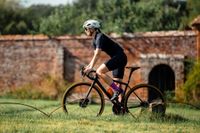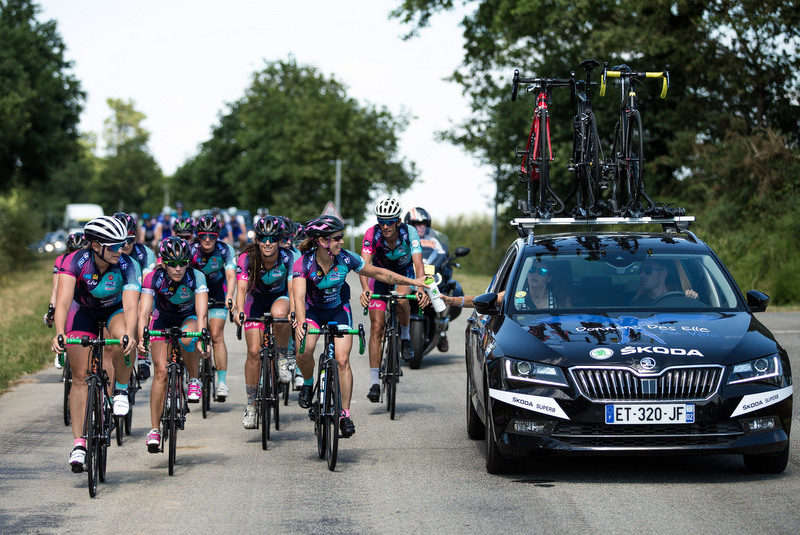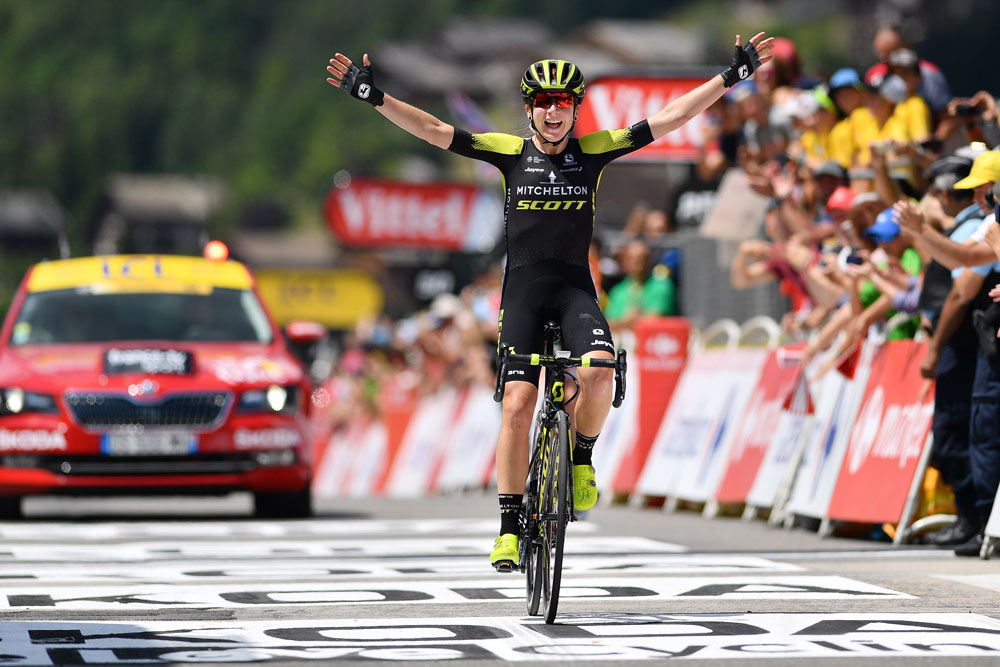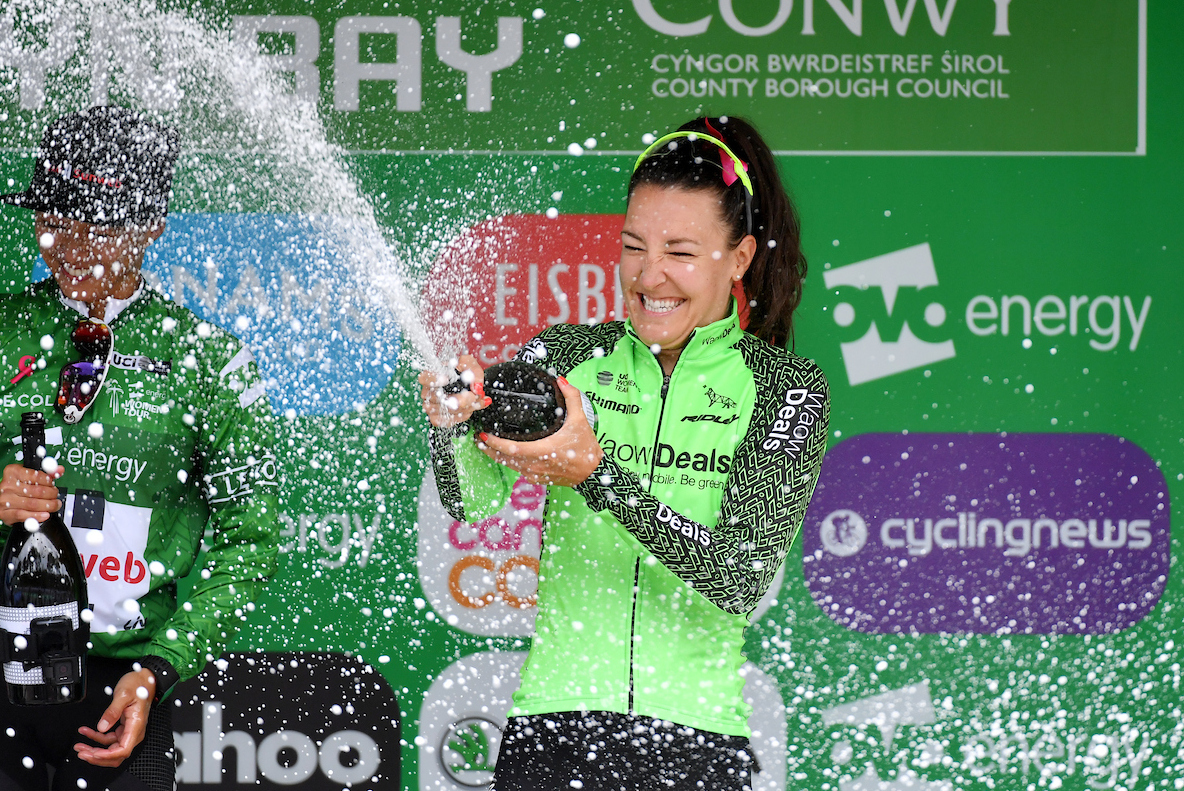13 women will ride into Paris tomorrow but parity is their finish line
The women's Tour de France has a turbulent history but these women want to prove an equal race is possible. For sponsors, and support, we may be better off looking closer to home


Image: Charlie Forgham-Bailey (Skoda)
A group of 13 women will embark upon the final stage of the Tour de France on Saturday, but unlike the men’s pro peloton, their target won’t be ticked off come the Champs-Élysées.
The ‘Donnons des Elles au Velo J-1’ team began riding the full route of the Tour de France, one day ahead of the men, in 2015.
Each year, the small but determined peloton - whose name translates along the lines of 'let's give them the bike, one day before' - has grown. In 2018, 13 amateur women set about tackling every metre of climbing, every descent and every flat road of the 3,351 kilometre route enjoyed by the men at the 105th edition of the French race.
Their aim is to demonstrate that - put aside the sponsorship battles and the TV scheduling issues - it's physically possible for the female pro peloton to have its own women’s Tour de France.
The long term goal is that one day, the amateur riders taking part (strong as they are) will be watching the pros from the roadside instead of taking part themselves.
The group has been joined by pro cyclists and journalists along the way, including Dame Sarah Storey who commented: "The Tour de France is known worldwide for its epic stages, its poetry, it's romanticised. Women are asking all the time to say 'please, let us race the hardest races'.
"There's a vicious circle, because if you don't have the coverage, you don't get the audience, and if you don't get the audience you don't get the coverage. So someone has to make the first move. You only have to look at the Olympic Games and the Paralympic Games to see that the women's races are as popular as the men's races.
The latest race content, interviews, features, reviews and expert buying guides, direct to your inbox!
"[These women are] proving a point that continues to need to be proven until we get equality in women's cycling."
The women's Tour de France
The women’s version Tour de France has a turbulent history, largely consisting of a pattern of success followed by outages, cancellation - usually due to funding -rejuvenation and more of the same.
The first Tour Cycliste Feminin took place in 1984, covering 15 stages of 21 days. It went through a variety of iterations over the next two decades, until in 2009 the 'Grande Boucle Féminine Internationale' consisted of four stages. British rider Emma Pooley won (arguably Nicole Cooke was the first British winner of the Tour de France, in 2006 - not Bradley Wiggins in 2012), but joked that it was "more of a Petite Boucle than Grande.”
The Route de France Féminine could have been a useful successor, but both the 2017 and 2018 editions have been cancelled, due to indecision from the UCI over awarding the race Women’s WorldTour status and rows over dates, followed by the withdrawal of a department set to host two of six stages, respectively.
In 2014, following a petition from a group of existing and former pro cyclists - Kathryn Bertine, Marianne Vos, Emma Pooley included – ASO conceded to provide a one day race for women at the Tour de France, and La Course was born.

Four years on, in 2018 La Course was still only one day long. Viewers of the 118km stage - won in an 'impossible' last minute attack from Annemiek van Vleuten (Mitchelton-Scott) - were bowled over. Those who had followed Van Vleuten's dominance through ten-day long Giro Rosa perhaps less so, but then with no live TV coverage it's no surprise that they were in the minority.
The Giro Rosa is still the longest women's stage race. Twice as long as the Women's Tour, which applied for seven days only to be turned down by British Cycling. But despite the Italian race's grant to cover more kilometres than any other women's competition, many would argue that its organisers do very little to share the joy of the event beyond its own country. Holding it at the same time as the Tour de France doesn't help.

UCI president David Lappartient, on his appointment, said: “I want to see a women’s Tour de France within the term of my presidency. La Course is nice, but ASO can do more and I have put pressure on them to achieve this.”
Lappartient has indeed set about instigating a host of changes, though pressure alone frankly might not be enough to provide the diamond we're seeking from ASO, whose attitude is such that journalists never even got to interview Van Vleuten via a formal press conference at this year's La Course - the men's race had to be attended to.
Comparatively, the UK's Women's Tour - which, like the Donnons des Elles au Velo J-1, also receives support from Skoda - is renowned amongst the women's peloton for providing immaculate organisation.
The riders also repeatedly pass on appreciation for the cheering crowds (not quite the kind that reduced Cecile Uttrup Ludwig of Cervelo-Bigla to tears after La Course - but good none the less) of the Women's Tour, and amongst journalists it's well known for offering professional press support, as you'd expect at a men's race.
The women's field is continually evolving and growing stronger, with teams adjacent to the men's equivalents - Sunweb, Mitchelton-Scott, and we anticipate Trek-Segafredo - ensuring that there's strength and depth spread throughout the field - enough so to provide exciting Grand Tour racing. But can a three week women's race gain the attention it deserves alongside the biggest men's event in the calendar? Will ASO put up the logistics? It's debatable.
Thirteen amateur women will ride into Paris tomorrow, with parity as their long term goal. We all desperately want them to get it. But I've a sneaking suspicion that the greatest chance of a fair and equal stage race for women lies closer to home.
Michelle Arthurs-Brennan the Editor of Cycling Weekly website. An NCTJ qualified traditional journalist by trade, Michelle began her career working for local newspapers. She's worked within the cycling industry since 2012, and joined the Cycling Weekly team in 2017, having previously been Editor at Total Women's Cycling. Prior to welcoming her first daughter in 2022, Michelle raced on the road, track, and in time trials, and still rides as much as she can - albeit a fair proportion indoors, for now.
Michelle is on maternity leave from April 2025 until spring 2026.
